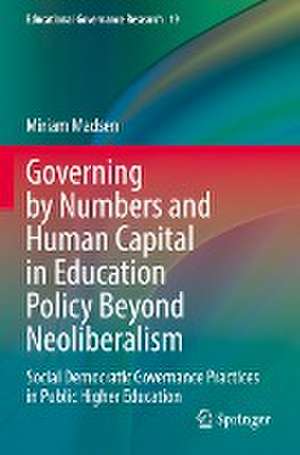Governing by Numbers and Human Capital in Education Policy Beyond Neoliberalism: Social Democratic Governance Practices in Public Higher Education: Educational Governance Research, cartea 19
Autor Miriam Madsenen Limba Engleză Paperback – 5 sep 2023
The book provides a thorough analysis of the quantification of graduate outcomes based on the philosophical framework of Agential Realism, thus offering a novel analytical approach to the study of data and indicators in educational governance. The book draws on a comprehensive ethnographic case study from Danish higher education,and relates the findings from this case study to empirical cases in other countries and international research in the field. The book brings together literature from various fields, including political science, accounting, education, and sociology of quantification, in order to provide a comprehensive account of how quantification practices affect education.
| Toate formatele și edițiile | Preț | Express |
|---|---|---|
| Paperback (1) | 553.86 lei 38-44 zile | |
| Springer International Publishing – 5 sep 2023 | 553.86 lei 38-44 zile | |
| Hardback (1) | 643.34 lei 3-5 săpt. | |
| Springer International Publishing – 4 sep 2022 | 643.34 lei 3-5 săpt. |
Din seria Educational Governance Research
- 24%
 Preț: 680.67 lei
Preț: 680.67 lei -
 Preț: 304.61 lei
Preț: 304.61 lei - 18%
 Preț: 941.05 lei
Preț: 941.05 lei - 24%
 Preț: 749.04 lei
Preț: 749.04 lei -
 Preț: 305.99 lei
Preț: 305.99 lei - 18%
 Preț: 732.70 lei
Preț: 732.70 lei - 18%
 Preț: 892.90 lei
Preț: 892.90 lei - 15%
 Preț: 641.38 lei
Preț: 641.38 lei -
 Preț: 389.88 lei
Preț: 389.88 lei - 18%
 Preț: 947.85 lei
Preț: 947.85 lei -
 Preț: 379.48 lei
Preț: 379.48 lei - 18%
 Preț: 1006.24 lei
Preț: 1006.24 lei - 18%
 Preț: 785.86 lei
Preț: 785.86 lei - 24%
 Preț: 832.93 lei
Preț: 832.93 lei - 24%
 Preț: 682.79 lei
Preț: 682.79 lei - 15%
 Preț: 637.59 lei
Preț: 637.59 lei - 15%
 Preț: 649.54 lei
Preț: 649.54 lei -
 Preț: 392.97 lei
Preț: 392.97 lei -
 Preț: 388.52 lei
Preț: 388.52 lei -
 Preț: 440.39 lei
Preț: 440.39 lei - 15%
 Preț: 700.94 lei
Preț: 700.94 lei - 15%
 Preț: 703.06 lei
Preț: 703.06 lei - 15%
 Preț: 587.53 lei
Preț: 587.53 lei
Preț: 553.86 lei
Preț vechi: 692.33 lei
-20% Nou
Puncte Express: 831
Preț estimativ în valută:
105.99€ • 115.09$ • 89.03£
105.99€ • 115.09$ • 89.03£
Carte tipărită la comandă
Livrare economică 19-25 aprilie
Preluare comenzi: 021 569.72.76
Specificații
ISBN-13: 9783031099984
ISBN-10: 3031099982
Pagini: 213
Ilustrații: XIV, 213 p. 8 illus., 5 illus. in color.
Dimensiuni: 155 x 235 mm
Ediția:1st ed. 2022
Editura: Springer International Publishing
Colecția Springer
Seria Educational Governance Research
Locul publicării:Cham, Switzerland
ISBN-10: 3031099982
Pagini: 213
Ilustrații: XIV, 213 p. 8 illus., 5 illus. in color.
Dimensiuni: 155 x 235 mm
Ediția:1st ed. 2022
Editura: Springer International Publishing
Colecția Springer
Seria Educational Governance Research
Locul publicării:Cham, Switzerland
Cuprins
Part 1. Introduction.- Chapter 1. The rise of outcome indicators in educational governance.- Chapter 2. Methodological approaches: Studying graduate outcome metrics and educational governance.- Part 2. Quantification practices: Human capital and the value of higher education.- Chapter 3. Quantifying higher education with graduate outcome metrics.- Chapter 4. Graduate outcome metrics and the economization of education.- Part 3. Governance practices: Indicators, hierarchical pressures, and temporal-affective effects.- Chapter 5. Calculative governance instruments.- Chapter 6. The governing properties of numbers.- Part 4. Data reception: Subjectivities and amplified resource inequalities.- Chapter 7. Subjectivizing effects of graduate outcome data.- Chapter 8. Educational development effects of graduate outcome metrics.- Part 5. Conclusion.- Chapter 9. Governance hybridity and its implications for education and research on educational governance.
Notă biografică
Textul de pe ultima copertă
This book addresses governing by numbers and human capital policy in higher education by asking how higher education is quantified, how the quantitative information is used in educational governance, and how the information is perceived by students, teachers, managers, and policymakers, and affects decision-making. It also thematically discusses how human capital theory affects the quantification practices and, thereby, their effects. Based on these analyses, the book asks whether governing by numbers and human capital in education policy are necessarily neoliberal practices, and thus questions the theory of global convergence in educational governance.The book provides a thorough analysis of the quantification of graduate outcomes based on the philosophical framework of Agential Realism, thus offering a novel analytical approach to the study of data and indicators in educational governance. The book draws on a comprehensive ethnographic case study from Danish higher education, and relates the findings from this case study to empirical cases in other countries and international research in the field. The book brings together literature from various fields, including political science, accounting, education, and sociology of quantification, in order to provide a comprehensive account of how quantification practices affect education.
Caracteristici
Adds specificity and critique to theorizations of educational governance Offers an analytical approach to the study of data and indicators in educational governance Brings together literature from various fields in relation to quantification in public governance
